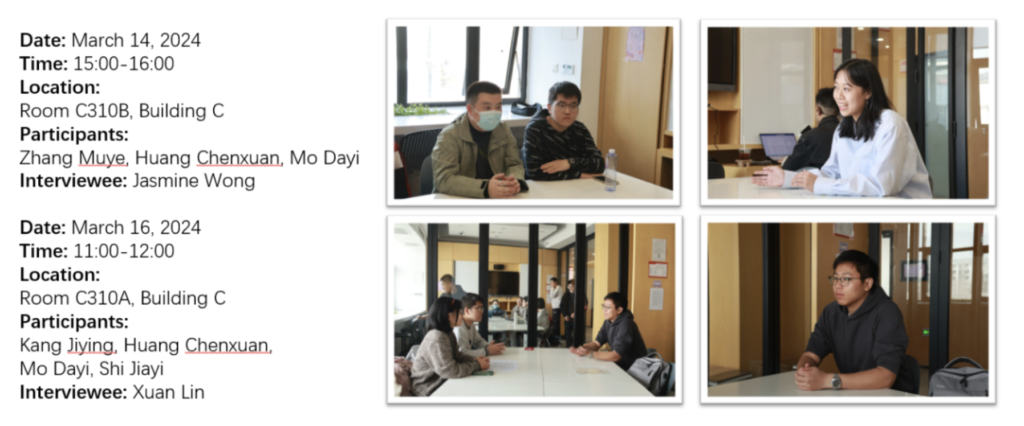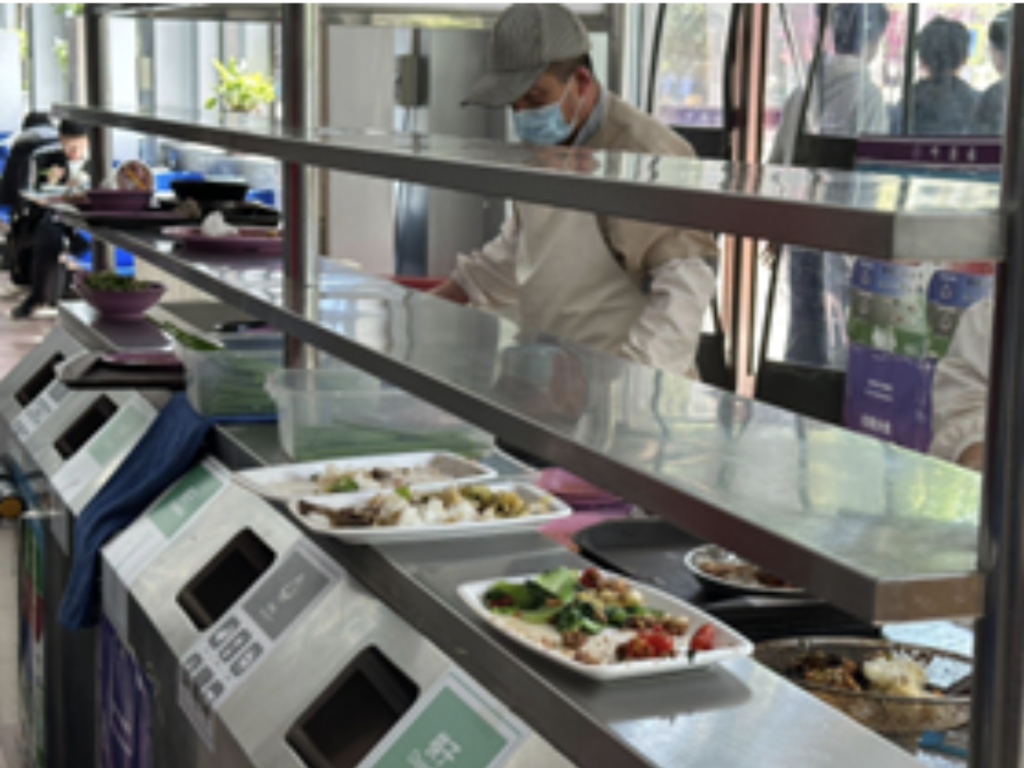
Below are updates from our four student group projects as of mid April 2024!
Final project presentations will be posted in summer 2024.
—————
Common Ground Education Group Update
The Common Ground Education Group has recently achieved two main objectives. First, we have been conducting interviews with American students studying in China. To date, we have interviewed seven of our planned ten American exchange students at Tsinghua University. We have asked about topics such as their motivations for coming to China, their choice of Tsinghua, daily life, and academic differences. For instance, we explored questions like: “Which exchange program did you participate in, and how did you learn about it? How has the language barrier impacted your daily activities, such as banking, shopping, or accessing medical services?” These interviews have been enriching, providing valuable insights into everyone’s experiences.
Second, we have begun production of a guidebook in collaboration with Chinese and American students. This guidebook includes sections on transportation and using WeChat effectively. Additionally, American students will conduct interviews with prospective students interested in studying in China and those who have completed their studies during an upcoming student meeting. Furthermore, one American student is tasked with organizing and researching the historical aspects of Sino-American exchanges and will create a video to enhance our presentation.

Common Ground Participants at Tsinghua University Interview Study Abroad Students
Update Written by Muye Zhang (张牧野), Common Ground student participant from Tsinghua University
Common Ground Energy Group Update
Recycling end-of-life EV(electric vehicle) batteries can reduce both the need for new mining and the pollution of waste batteries in the environment. Failure to recycle these batteries also results in economic loss as they contain valuable materials such as lithium and cobalt. For China and the United States, progress in battery recycling in either country could help reduce competition for material supply in third countries. However, since geostrategic competition knows no boundaries, EV battery recycling could become a new area of conflict. Therefore, our energy group has decided that our research question will be “What are the obstacles and possibilities for battery recycling collaboration between China and the US?” Specifically, we focus on Lithium-ion batteries (LIBs), which are widely used in electric vehicles.
This research begins by examining the importance of Lithium-ion battery recycling and explores why it represents a potential area for collaboration between the US and China. Next, we delve into the current state of policy and technology in Lithium-ion battery recycling. Following this, we analyze potential obstacles to collaboration and successful energy-related collaborations between the US and China. Finally, we offer recommendations to stimulate future cooperation. We will have two deliverables: slides presented in our April 26th group meeting and a paper with more details. Our key audience, which includes politicians, scientists, environmentalists, and university students from both countries, will be presented with a convincing report to help promote cooperation between the two countries in the field of battery recycling.
Written by The USCET Students Finding Common Ground Energy Team
Common Ground Environment Group Update
The Climate and Environment Team project is titled “Combating Food Waste at US and Chinese Universities— A Low Hanging Fruit for GHG Mitigation.” A non-controversial topic for the US and China to find common ground, our work highlights shared challenges faced by US and Chinese universities in reining in food waste. We are looking at lessons learned to improve campus food waste management which will also lower the universities’ greenhouse gas footprint.
Building on our literature review and initial interviews, the Climate and Environment Team has continued work on the field research stage by gathering data and conducting more interviews. Our three target groups for interviews are:
1. Campus sustainability offices;
2. Cafeteria workers/managers at university dining halls; and,
3. NGOs working on food waste mitigation in both China and the United States.
The China Team had lively interviews with the Tsinghua University Student Association on Net Zero Future on March 30 and the Director of Rare, Center for Behavior & the Environment in Beijing, Shiyang Li on April 9. The interview with Director Li yielded valuable insights on the research process for an NGO that is helping Chinese restaurants reduce food waste. She also gave us valuable suggestions on how to improve our own project through the use of behavioral science methodology and tools. The China Team has also been documenting food waste in Tsinghua University’s campus dining halls through on-site visits.

Leftover food on student lunch trays in a Tsinghua University cafeteria as documented by the China Team
The U.S. Team connected with other GW students researching food waste in Shenkman Hall, the newest dining hall on campus opened in the Spring 2023 semester. Shenkman Hall was the final step in the overhaul of GW’s dining system, requiring students housed on campus to purchase meal swipes for use at three buffet-style, all-you-can-eat facilities. The GW capstone project work will be completed at the end of the semester, presenting a model tailored to Shenkman Hall that identifies the factors most highly correlated with food waste. We will be able to mine their report for valuable insights.
A representative from the U.S. Team attended the GW Dining Student Advisory Panel Meeting on April 19 to observe student-led efforts to improve the campus dining experience and inquire about channels for presenting our findings. The U.S. Team also interviewed Colin O’Brien – the Sustainability Associate at GWU’s Sustainability Office – and sent interview requests to the GW Dining Office to assess the scale of food waste on campus and how existing waste processes may be improved.

GW Dining food waste data collected in December 2023
As we compile and examine our collected research, the Climate and Environment Team hopes to present our findings on multiple platforms to reach our primary audiences: university students and administrators. The US-China University food waste partnership model will be published on social media platforms, shared with student organizations, and presented directly though briefings to administrators. Our team is proud of all of the hard work accomplished up to this point, and looks forward to sharing meaningful research on a path forward to greater U.S.-China collaboration.
Written by The USCET Students Finding Common Ground Climate and Environment Team
Common Ground Economics Group Update
In an era of mounting environmental challenges and shifting geopolitical landscapes, our research group is embarking on an analysis of the opportunities and challenges in fostering U.S.-China collaboration within Vietnam’s electric vehicle (EV) industry. As the world witnesses an unprecedented surge in demand for sustainable transportation solutions, understanding the dynamics between these two economic giants and their impact on Vietnam’s thriving EV market is paramount. By choosing Vietnam as our focal point, we aim to unveil the long-term evolution and untapped potential of U.S.-China collaboration through the lens of a third-party country, offering fresh perspectives and invaluable insights.
Vietnam’s strategic position in the heart of Southeast Asia, coupled with its rapidly growing economy and commitment to sustainable development, makes it an ideal case study for examining U.S.-China cooperation in the EV sector. Our team has adopted a multifaceted approach to unravel the complexities of this topic, with Xinyue and Skyler spearheading quantitative analyses of the EV market in Southeast Asia and conducting a comparative study of the Regional Comprehensive Economic Partnership (RCEP) and the Indo-Pacific Economic Framework (IPEF) provisions. Their findings will shed light on the potential impacts on Vietnam’s EV supply chains and export competitiveness, providing a solid foundation for understanding the region’s EV landscape and its implications for global trade.
Recognizing the critical role of EVs in promoting sustainable development and green growth, Yuan has been diligently investigating the environmental benefits of collaborative efforts in Vietnam’s EV industry and the broader ASEAN region. Her research highlights the immense potential for U.S.-China cooperation to drive the transition towards a low-carbon future in Vietnam and across the entire Southeast Asian region. Meanwhile, Aidan has been exploring the geopolitical implications of U.S.-China cooperation in Vietnam’s EV industry, focusing on the role of ASEAN states in shaping these dynamics. This will provide a roadmap for navigating the complex geopolitical landscape and fostering regional stability through collaborative efforts in the EV sector.
Central to our research efforts is the active collaboration among our team members. Our interactive sessions have enriched our understanding of the multifaceted aspects of U.S.-China collaboration, fostered a deep sense of camaraderie and teamwork,. and helped us to develop a nuanced perspective on the challenges and opportunities in promoting U.S.-China collaboration in Vietnam’s EV industry.
Recognizing the significance of policy frameworks and international partnerships, Aidan, Yuan, and Zhijun have examined the IPEF framework provisions on EVs and explored models for trilateral cooperation. Their findings will offer valuable insights into the role of international agreements in shaping the future of the EV industry and the potential for collaborative efforts to drive sustainable growth. Simultaneously, Yixuan has been conducting in-depth firm-level case studies, focusing on major players in the Vietnamese EV market to gain a granular understanding of the dynamics of foreign investment and its impact on the industry’s development.
Our team will develop actionable recommendations to pave the way for mutually beneficial partnerships between the U.S. and China in Vietnam’s EV sector. By leveraging our diverse expertise and unique perspectives, we aim to contribute to the broader discourse on sustainable transportation, economic cooperation, and regional geopolitical dynamics. Our goal is to provide a blueprint for fostering collaboration, addressing strategic concerns, and advancing sustainable development in the EV industry in Vietnam and globally.
Written by The USCET Students Finding Common Ground Economics Team
